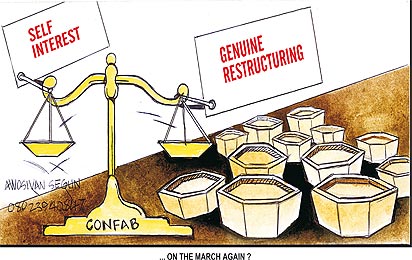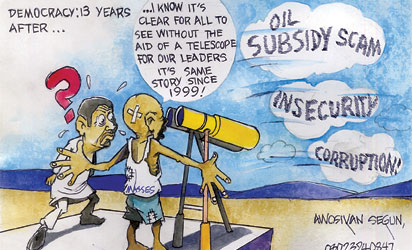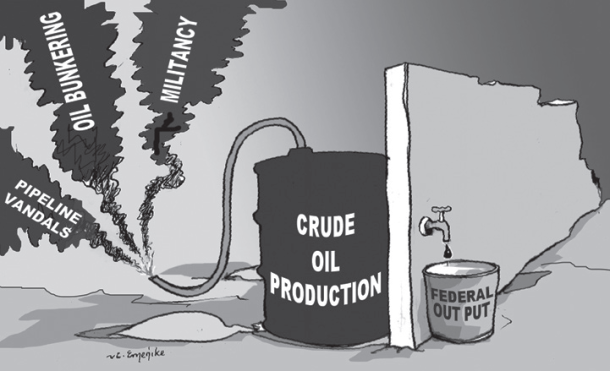Calls for the restructuring of Nigeria have been echoing in the national consciousness for a significant amount of time. The agitation for a restructuring on the basis of fiscal federalism has gained significant momentum as a result of the successful national conference and the subsequent submission of the nation conference report.
In June this year, eminent personalities, politicians and activist lent their voices to this agitation. Some of whom include, Dr. Alex Ekwueme; Afenifere chieftain, Chief Ayo Adebanjo; and a former Minister of Information, Prof. Jerry Gana, on Sunday in Enugu, urged President Muhammadu Buhari to restructure Nigeria in order to avoid the imminent break up of Nigeria as well as addressing the inequalities created by the military. All were also in agreement that the current agitations by the NDA, the MASSOB and the IPOB among others, would persist unless there was an immediate restructuring of the country.
Governor Ambode added that, federating units of the country must be allowed to develop at their own pace, saying it was important for the country to address the wrongs of the past.
Most of the speakers also canvassed the implementation of the recommendations in the 2014 National conference report, Dr Ekwueme expatiated on the need for restructuring in his address, stressing that it was time for Nigeria to revert to the basic principles and arrangements left behind by the country’s founding fathers.
He suggested that a six geo-political zonal structure was the solution to the ills plaguing Nigeria. Such a structure wills safe guard the interest of minorities in both the North and the South.
According to him;
“In the south, you have the South-West, the Yoruba; you have the South-East, the Igbo; and then you have two minority groups, Mid-West and COR (Calabar, Ogoja and Rivers) as South-South.
“In the North, you have the North-West, which is Hausa/Fulani; then the North-Central, Middle Belt, which is the aggregation of minorities, and then in the North-East again, minorities predominated by Kanuris in Borno and Yobe and then other minority groups.”
A regional government arrangement, where each of the federating units had a constitution, which was annexed to the Republican Constitution of 1963, the Republican Constitution worked based on a sharing formula that allocates 50 per cent to the regions, 30 per cent to a distributable pool and 20 per cent to the centre.
He ended by saying;
“There is a need for us to return to the basics from what we inherited from our founding fathers,”
“The autonomy the regions enjoyed under the federal constitution gave each region the liberty to develop at its own pace according to its priority.”
These suggestions and agitations are not new and several policies have been put in place to ensure different ethnic groups are represented at a federal level and have equal access to equity and justice. Before and after independence in 1960, Nigeria was a unitary state of three Regions: Northern, Western, and Eastern. In 1963, the new Mid-Western Region was carved out of the Western Region. In 1967, by a military decree, the regions were replaced by 12 states. In 1976, seven new states were created, making 19 altogether. The Federal Capital Territory was established in 1991. In 1987 two new states were established, followed by another nine in 1991, bringing the total to 30. Another 6 states were created in 1996, resulting in the present number of 36 states.
With State creation, regions were given more autonomy, their identities preserved and it reduced the level of completion at the federal level. To an extent this brought peace as relates to the psychological needs of ethnic groups for identity, security, recognition, participation, and autonomy.
Unfortunately, historically those who get state power have used it for their own selfish interest.
Nnoli (1978) the most ardent of advocates of new states or regions have always been aspirants to high positions in the political. Administrative, professional and business fields who have failed to attain positions of pre-eminence at the national, regional or state levels and who hope to attain such heights in smaller constitutional entities,
Due to the hoarding of the common wealth by the political elite, inadequate resources are allocated for the benefit of the masses. Social services such as Health and education facilities are underfunded as well as essential structures that would allow the flourishing of the state’s economy. Furthermore most of these states that have been created are not economically viable. These conditions create scarcity which increases competition and leads to ethnic conflict. Ironically, Ethnic tensions have not only continued to increase with the new state creation, it has also intensified. Socio-economic policies in states that serve to act as protective barriers to completion from non-indigenes, such as exclusive employment opportunities for indigenes whilst this prevents competition on the short term, it does not foster national integration.
Policies that have been put in place to address issues raised by these eminent Nigerians Include;
The Federal Character Principle
Enshrined in the 1979 constitution, the federal character principle seeks to ensure that the distribution of appointments on the federal level reflects the plurality of ethnic identities that make up Nigeria (Okpako1998). The states must be similarly run to reflect the existence of different ethnic groups of local government areas. This policy is supposed to allows all ethnic groups gain access to the topmost level of government. This gives the various ethnic groups a participatory sense of belonging. The failings of this principle have been the sacrifice of merit in favour of ethnic balancing.
(Okpako 1998) avers that ‘The pursuit of the federal character principle has proved inadequate for effective nation building in Nigeria. It is argued to be at the heart of corruption among high office holders, who see their appointments as privilege, not responsibility, and are primarily concerned about enriching themselves and their people.’
(Ojie1998) had this to say about the failings of the federal character principle.
‘It sacrifices national progress and development on the altar of ethnic sectarianism as mediocrity takes precedence of meritocracy in the conduct of state affairs. These are evident in the admission of students into our national and state institutions, appointments to positions in federal and state governments and parastatals , localization of industries and amenities .’
This policy is encouraged and accepted by the masses based on their psychological need for ethnic representation at the federal level. The typical Nigerian monitors the ethnicity of appointments as one would do a football match, without recourse to how a particular appointee can contribute to sustainable national development. Even when appointees have been shown to be corrupt, people of his ethnic group would defend him out of ethnic allegiance at the detriment of National development.
The inadequacy of the federal character principle to eliminate ethno-regional conflicts in the polity is evident with the numerous agitations by various ethnic groups for restructuring. We must consider the motivation of these eminent Nigerians as well as the true requirements of the masses with an aim to understand how the existing federal structure stands in the way of achieving the betterment of the masses that make up these ethnic groups.
Resource control & Derivation
To assuage communities from which the Federation derived its significant revenue, the derivation formula was put in place. The derivation formula refers to the percentage of the revenue oil–producing states retain from taxes on oil and other natural resources produced in the state. These allocations have varied from as much as 50%, owing to the First Republic’s high degree of regional autonomy, to as low as 10% during the military dictatorships it is currently 13% and even at that, there is still loud agitation for greater regional autonomy. To mitigate this as well as the complaints by ethnic groups local to the area for more access to oil revenue and ownership as well as the unprecedented amount of damage to their land caused by pollution due to gas flaring and oil spills, the Federal government set up the Niger Delta Development Commission (NDDC).
The Niger Delta Development Commission was established by Nigerian president Olusegun Obasanjo in the year 2000 with the sole mandate of developing the oil-rich Niger Delta region of southern Nigeria. In September 2008, President Umaru Yar’Adua announced the formation of a Niger Delta Ministry, with the Niger Delta Development Commission to become a parastatal under the ministry.Unfortunately these parastatals have been riddled with corruption scandals and as we have come to see, the elite of their society simply used the genuine desires of the masses to push for their own self enrichment.
Several former Niger Delta militants were made extremely wealthy by virtue of several choice contracts allocated to them as well as payments remitted as part of the amnesty program.
 Unfortunately these areas and the masses that make up these ethnic groups remain poor, the regions remain underdeveloped with a large infrastructure deficit.These conditions have lead to another set of militants rising up to replace those that were silenced by amnesty payments. It goes to show that as long as the underlying problems of pollution, extreme poverty as well as low development, these situations would constantly arise keeping Nigeria perpetually at the edge of another uprising.
Unfortunately these areas and the masses that make up these ethnic groups remain poor, the regions remain underdeveloped with a large infrastructure deficit.These conditions have lead to another set of militants rising up to replace those that were silenced by amnesty payments. It goes to show that as long as the underlying problems of pollution, extreme poverty as well as low development, these situations would constantly arise keeping Nigeria perpetually at the edge of another uprising.
The calls for restructuring does not address the facts that most of the state governments as they exist today are poorly run and seventy percent of the Nigerian population live below the poverty line. It does not address the fact that despite significant revenue from him Oil prices and a president from a minority ethnic group, the nation is still betrothed to poverty. The creation of more states or the increase of derivation payments to individual states does not guarantee a better standard of living for the people of that ethnic group, rather as history has shown, It leads to a new crop of political elite siphoning the common wealth for their own personal gain. As we have seen several states that have been created are not viable without the FAAC allocations, several states are bankrupt and cannot afford to pay salaries.
While there is urgent need for restructuring and true fiscal federalism, it must be done with an aim to uplift the living standards of the masses as opposed to the satisfaction and enthronement of the political elite. Restructuring must be done in such a way that increases the security of the people and ensures consistent regional development, checks and balances must be put in place to ensure the common wealth is not exploited and development actually happens. Without these in place, scarcity and competition would cause another set of people to rise and start another round of agitation, destruction and violence far worse than what we are currently experiencing.
The Nigerian government must actively curb expansionist tendencies of some ethnic groups that seek to consolidate their hold on their traditional ethnic-regions while simultaneously seeking control of other territories. This neither fosters trust nor does it facilitate National integration.
Policy Recommendations;
State Police
Policy interventions must be directed in such a way that benefits the majority of these communities. In order to achieve security and peace in communities, States should be allowed to have state police which would answer directly to the governor. Measures such as this would allow the state government take full responsibility for the security and safety of its residents.
A concern is how this state police force can be manipulated and used during elections. A caveat to the formation of state police can be that during elections, the civil defence and the Army would oversee security during elections.
Development Fund
While fiscal federalism is desired, it must be done in such a way that we do not create scarcity and excessive competition in less viable regions of Nigeria. The poverty and scarcity in poorer regions would ultimately lead to conflict and mass migration, which will in turn bring conflict to the peaceful regions of the Nation.
The derivation formula if it is adjusted to the rates manifest in the first republic, protocols must be put in place to ensure these funds are utilized for development. To access the extra funds, States must present a ten year development plan with key projects and a budget to achieve these goals. This budget must be analyzed and a national scale and standards for cost, quantity and quality must be set. All proposals must fit within the parameters set by that scale, e.g. 1 kilometre of road of certain specifications cost x in a particular region. These excess funds must then be paid in tranches directly towards these projects, which will be monitored at the federal level by the ministry of works, the EFCC and other relevant agencies. Intervention funds must also be created for regions that are not self sustaining. Such funds will be released in the form of low interest loans and directed in a similar manner as the above towards projects that would create jobs and facilitate development
State Creation
The further creation of states must have independent state viability as a pre-requisite for state creation. States that cannot show how they can exist in a sustainable, self sustaining way without recourse to the federal government for allocations should not be created.States and State governments that cannot pay teachers or salaries must be put through a restructuring program or at the very least; their viability must be called in to question.
Reformation Of The Judiciary
The efficiency of the judiciary will create expedient and fair dispensation of justice, coupled with efficient law enforcement agencies are tantamount to a peaceful union. If the common man has access to the court of law as well as Justice in a timely fashion, such people might not be in a rush to meet out justice themselves. Investigative agencies and security agencies must be empowered to bring perpetrators of violence and vandalism as well as illegal possession of arms to Justice. Strict laws must be put in place to reduce civilian possession of weapons. Specialized Judiciary panels should be set up to try cases of this nature. An increased number of such panels would make the delivery of justice more expedient.
REFERENCES
Nnoli O 1978. Ethnic Politics in Nigeria. Enugu: FourthDimension
Ojie AE 1998. Prejudice and Discrimination in Nigeria:A Sociological Overview.In: UA Igun, AA Mordi (Eds.): Contemporary Social Problems in Nigeria. Ijebu-Ode: Shebiotimo Publications, pp.35-49
Okpako D 1998. Rotating Presidency or Looting. TheGuardian, October 19, 1998, p.49
Websites
https://en.wikipedia.org/wiki/Niger_Delta_Development_Commission
http://www.nddc.gov.ng/about%20us.html


